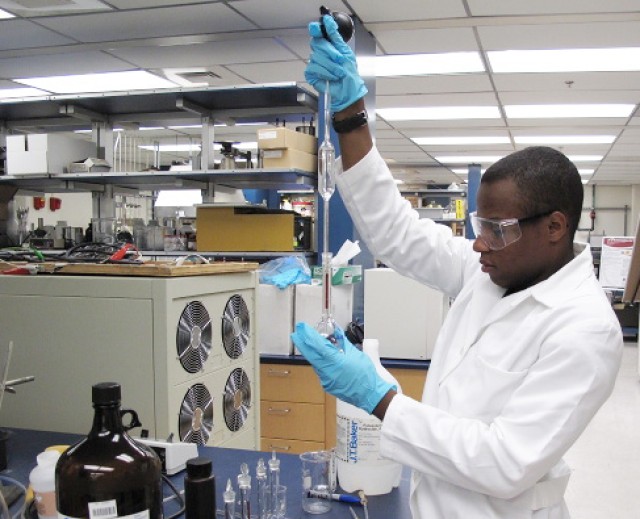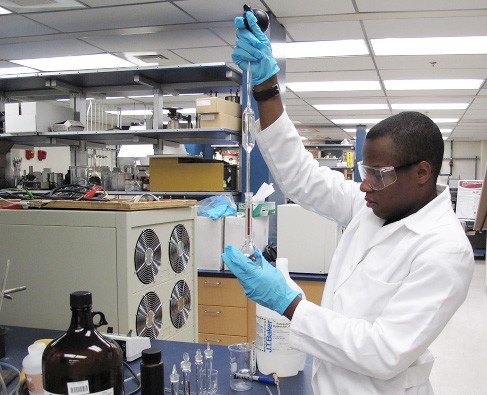Each summer the U.S. Army Research Laboratory welcomes cadets from the United States Military Academy at West Point to work on research projects alongside the laboratory's top scientists and engineers. This year, Cadet Zachary Brownlee spent several weeks working at the Adelphi Laboratory Center located in Adelphi, Md. under the direction of ARL researcher Dr. Deryn Chu.
As part of the Advanced Individual Academic Development (AIAD) program, Brownlee was provided a long list of organizations where he could participate in a summer internship. He chose to come to ARL to work in a fuel cell lab in the Sensors and Electron Devices Directorate's Electro-Chemistry Branch.
"I wanted to come here because I wasn't familiar with fuel cell technology," Brownlee said. "I thought it would be interesting, worthwhile, and a great learning experience to spend time with subject matter experts in this field."
Brownlee is from Conway, Ark. and is a junior majoring in mechanical engineering. He is part of the Charlie Company, 3rd Regiment, U.S. Corps of Cadets.
Despite his inexperience in the realm of fuel cell technology and research, Brownlee's mentors agreed that he immediately fit in at the lab and excelled in his work.
"I found Cadet Brownlee to be receptive and appreciative of the advanced scientific and engineering concepts, and he made considerable strides in his understanding of the science, engineering, and challenges of these devices," Chu said. "He showed an ability to learn and comprehend advanced materials related to fuel cells and electrochemistry."
While at ARL, Brownlee focused on learning about the principles, practices, and challenges associated with advanced fuel cell technologies. He participated in hands-on laboratory research involving the fabrication and testing of several low temperature fuel cells.
"Cadet Brownlee's efforts included the experimental examination of the effects of unique alcohol-based fuels, fuel concentration, and a post-mortem analysis of a non-functioning direct methanol fuel cell, " Chu explained.
Brownlee said his experience at the lab made him realize the importance of fuel cell research and the critical nature of this technology in terms of Warfighter safety and success.
On average, Soldiers carry more than 45 pounds of basic body armor, weapons, ammunition, food, and other tools and equipment while on missions. Some Soldiers, depending on their role, will carry up to 35 pounds of batteries for a 72-hour mission. Brownlee spent time with scientists from SEDD's Electro-Chemistry Branch who are working to significantly reduce the battery weight Soldiers carry by creating fuel cells that are lighter, safer, and more efficient and durable than existing batteries.
Currently, the most widely-used Soldier power source comes from batteries that are unable to operate for extended mission durations, Brownlee explained. DMFC systems are capable of providing electrical power at high energy densities and low thermal signature. They are also capable of a notable increase in energy capacity when compared to the standard lithium sulfur dioxide battery.
"If we could reduce the weight that Soldiers carry in batteries, it will make a huge difference," Brownlee said. He added that carrying 20 fewer pounds "will positively impact a Soldier physically and mentally."
Brownlee said his AIAD internship with ARL made him reflect on his future options in the Army.
"I can see myself doing work like this in the future," he noted. "I enjoyed my time and learned about not only fuel cells, but (also) the non-combat side of the Army and what scientists here are doing for the Soldier every day."
ARL has participated as a sponsor for the USMA Cadet AIAD program for many years.
As a sponsor, ARL is a major component in the collaborative objectives of the program. It provides cadets a unique opportunity to spend time in state-of-the-art facilities while studying and applying scientific and engineering concepts that were learned in the classroom.
The lab mentors are a critical element to the success of the internship program because they work directly with cadets in the lab to further develop their knowledge and skills and broaden their perspectives while also contributing to their preparation as future military leaders.
Not only do cadets enjoy and benefit from an ARL experience, but mentors and other team members from the lab value the knowledge that cadets offer as well as their feedback and ideas regarding matters of science and technology.
Brownlee and Chu agreed that their time together was well spent and they are looking forward to their next meeting at the ARL-USMA Technology Symposium in Atlantic City, N.J. in the fall.


Social Sharing